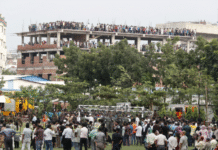Sadeq Khan
The mystifying manner of the recent arrest of senior citizen Shafik Rehman, a sociopolitical satirist, popular TV anchor and also a leader of the foreign relations wing of the mainstream opposition party BNP, raised many eye-brows and many whispers.
The “arrest made at second attempt” was reported as follows four days after the occurrence in a tabloid daily popular with fashionable young elite of Dhaka: “Sajib Onasis, assistant editor of Mouchakay Dheel magazine, told the Dhaka Tribune that two people claiming themselves as journalists of Boishakhi TV came to the house around 7:30pm on April 13 and wanted to take interview of Shafik Rehman: ‘Hearing this, Shafik Rehman asked me to talk to the visitors. I went to the gate and found two persons wearing T-shirts waiting outside. But seeing me, they said they will come another day as they had an emergency assignment at some other place.’
How he was arrested
Security guard of the house Abdur Rahim said that when the duo identified themselves as media persons and said that they would take an interview of Shafik Rehman, “I wanted to see their visiting cards. They said that they did not have the cards with them. One of them said, ‘Our sir is at Holy Family Hospital. He will give you the card once he arrives.’ But within a few minutes after making a short phone call they told me that they will come another day as their sir has gone for another assignment.”
The newspaper speculated that the detectives went back on 13 April without arresting Shafik Rehman because people were out on the streets around his house on that day as Dhaka was shaking under a tremor-transmission from an earthquake epicentred in Myanmar. About the actual arrest, the report quoted the detainee’s wife Taleya Rehman, hereself a prominent human development activist: “Shafik’s wife Taleya Rehman said three people, introducing themselves as journalists of Boishakhi Television, come to the house to interview her husband around 7:30am. She said her husband was asleep at the time but as he went downstairs to meet the three persons after waking up, they claimed to be detectives. ‘The plain-clothes men were rude with the household staff and also scolded them. We later heard that Shafik was arrested in a case filed with Paltan police station,’ she said.”
If one goes to facebook or youtube, one is simply dumbfounded by the verbal violence of reaction to the charges preferred against Mr. Shafik Rehman.
Surprising announcement
The CID and the DB police are taunted by many for failing to as yet uncover the identity of the killers of the latest “freethinking blogger” Nazimuddin Samad, or more pointedly, failing to take any action against the identifiable few who could have messed with the key, password and codes of Bangladesh Bank (BB) SWITCH money transfers resulting in $81 million dollar reserve heist from BB account. Both the incidents drew would media headlines.
Some said that Bangladesh police and higher government authorities are now seeking to divert world attention and domestic criticism by staging an enigmatic act of arrest of a well-known media personality like Mr. Rehman, framing him in a far-fetched spin of ‘conspiracy to murder case, and provoking maximum publicity by sensationalising it by statements and news leaks by police authorities.
What is most surprising is that in the middle of Mr. Rehman’s remand with the Detective Branch of the Police, an Additional Commissioner of Dhaka Metropolitan Police made public to the media that Mr. Shafik Rehman admitted having more than one meeting in the US with those involved in a “conspiracy” against prime minister’s son Sajeeb Wazed Joy: “He [Shafik Rehman] has admitted having meetings. This means he held more than one meeting there [in the US] with those who would kidnap [Joy] and provide information.”
The Additional Commissioner, who also heads the DMP’s Counter Terrorism and Transnational Crime Unit, said Shafik admitted meeting four persons who include the three convicted by a US court over bribing an FBI special agent to collect confidential information, namely US-Bangladesh citizen Rizve Ahmed Caesar, former FBI special agent Robert Lustyik and his “contact” Johannes Thaler. Caesar had couriered some documents to daily Amar Desh Editor Mahmudur Rahman while Rehman received some documents through email. He did not explain how that could amount to ‘conspiracy to murder.’
The attempted ‘media trial’
It is a despicable practice of the Bangladesh police seeking ‘media trial’ of an accused ahead of trial in court. Only the other day, the International Crisis Group in its latest focus on Bangladesh published in its website pointed to this malpractice, and advised the government “to avoid statements throwing suspicion on person or persons as responsible for crimes while investigations were ongoing; and to end the practice of presenting suspects to the media, rather than in court, as required by the constitution.”
Reaction of the users of the social media was almost universally that of disbelief, and some were apprehensive that detectives extra-loyal to the leaders of the incumbent regime were “applying torture methods” on the senior citizen Shafik Rehman, weak as he may be in body and mind with age, blackmailing him with threat of physical pain to become an Approver to implicate senior BNP leaders at will in the contrived conspiracy case. Thus, the publicity dividend that the government is deriving from the detention drama and Shafik-Mahmudur conspiracy theory is patently negative.
Some people are wondering what consideration or compulsion prompted the ruling coterie to stir up the hornet’s nest of such adverse public reaction at this stage. The April update of the House of Commons briefing on Bangladesh political situation credits the ruling leaders with evident control over the country’s affairs and comparative advantage in the political process. The Commons Briefing Paper reads: “The ruling Awami League (AL) seems to be in the ascendancy, while its bitter rival, the Bangladesh Nationalist Party (BNP), is in apparent retreat.
“The BNP is on the back foot. Following months of strikes and blockades against electoral arrangements in the January 2014 parliamentary elections, which the BNP boycotted, protests died down during the course of 2015. …… BNP leader Khaleda Zia faces a range of charges in the courts and could eventually find herself in jail or excluded from political life.
Wild guesses & speculations
The ruling AL, led by Prime Minister Sheikh Hasina, appears determined to press home its political advantage ahead of the next parliamentary elections in 2019. Critics accuse the Government of growing authoritarianism – a charge it denies. …… Three leading opposition figures – one from the BNP and two from the main Islamist party, the Jamaat-e-Islami, were hung during 2015. Domestic opponents continued to argue that the trials were politically motivated. There also continued to be claims that trials did not meet international standards.
“There were concerns about a growing threat from Islamist terrorist groups. Four secular bloggers and one publisher were murdered in the capital, Dhaka, during 2015. Foreigners have become the target of attacks, with two being killed in October. The Bangladesh Government held home-grown militant groups responsible and rejected suggestions that Islamic State/Daesh was gaining a foothold in the country.
2015 was an important year in Bangladesh-India relations. In June the two countries resolved their long-running border dispute, agreeing to a process of swapping enclaves of territory and the final demarcation of the border. A wide range of other agreements were also reached. There continued to be enhanced cooperation on the issue of Assamese separatists based in Bangladesh.”
Scepties are therefore making all sorts of wild guesses and fanciful speculations. Some secret trouble of the people at the top, they whisper, must be making them lose their heads and land into messy situations like the belated prosecution of Mr. Shafiq Rehman, implicating him in a matter that occurred in 2014, and closed by indictment over a year back.
Source: Weekly Holiday









